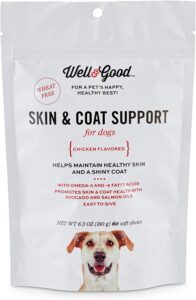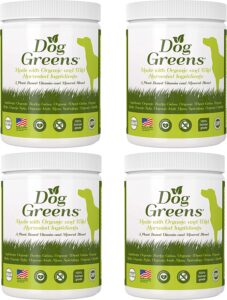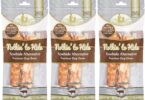Have you decided that you want to go the all-natural route when it comes to dog food and want to tackle making your own? Excellent choice! This way, you know exactly what’s in your dog food and how much of each ingredient your pup is getting. There is a bit of a downside when it comes to homemade dog food, though. No, the commercial dog food you’re buying at your local pet store may not have the high-grade ingredients you’re looking for but it probably does have added supplements that your pup is won’t get from homemade dog food alone. So, how do you figure out what supplements you need to add? This depends on a variety of factors, including the size and breed of your dog as well as their age, weight, activity level, any health concerns they may have, and, of course, the ingredients that are going into your homemade dog food. While you should always consult a veterinarian to make sure your pup is getting enough nutrients, let’s take a look at some common supplements for homemade dog food.
Contents
Do I really need to give my dog added supplements?
You may be wondering, how is it possible that I’m giving my pup a diet of chicken, beef, sweet potato, broccoli, kidney beans, brown rice, and a bunch of other yummy ingredients, healthy ingredients but they’re still not getting enough nutrients? Excellent question. Although in our minds these ingredients should be enough, research shows otherwise. The results from a 2013 study at the University of California were alarming when it came to the nutritional value of homemade dog food recipes. This study selected a total of 200 recipes from 34 different sources, including pet care books, websites, and even veterinary textbooks. The results indicated that only nine of the 200 recipes selected included all of the essential nutrients necessary to meet the minimum standards established for adult dogs by the Association of American Feed Control Officials. Only one of these recipes came from a veterinary textbook. Five of these recipes which were written by veterinarians included enough essential nutrients to meet the National Research Council’s Minimum Requirements for adult dogs. So, yes, your pup needs added supplements.
What supplements does my dog need?
We’re going to give it to you straight here – there is no definitive answer to this question. It depends on what recipe you’re looking to feed your pup as well as your dog’s weight, age, and exercise level. If you do not wish to initially consult with a veterinarian or pet nutritionist, there are ways research and figure this out yourself before checking with your veterinarian to confirm. There are online handbooks to help you figure out your pup’s nutritional needs based on a variety of factors, including weight and activity level. You should also research the number of calories and the nutritional value of the recipes you wish to feed your pup and go from there. Some common supplements that are used in homemade dog food are:
- Calcium supplements (some opt to use crushed eggshells as an alternative)
- Multivitamins
- Fatty acids (e.g. fish oil)
- Protein
- Vitamins A and E
- Hip and joint supplements
Of course, this is not an exhaustive list and it doesn’t mean that your pet needs all of them. Also, consider that the way your dog’s food is cooked and stored can also lower the nutritional value of your homemade dog food recipes. Nutrients can be destroyed through both heating and the freezing food.
Skin and coat issues
There are certain supplements that are obvious when it comes to whether or not your pup could benefit from them, regardless of your homemade dog food’s nutritional value. If your dog suffers from skin and/or coat issues, it is beneficial to give them supplements that contain fatty acids. These can be in the form of dog chews that can be given separately as yummy treats. The Skin and Coat Support for Dogs by Well & Good are daily chews that are formulated with high-quality ingredients and focus on Omega-3 and 6 fatty acids, including avocado and salmon oil, to give your pup the boost that they clearly need. If your pup suffers from any medical issues, it’s essential to consult with a veterinarian to make sure that these, as well as any supplements you may be giving your dog, are safe.
Vitamin and Mineral Supplements
There are many vitamin and mineral supplements on the market that claim to provide your pup with all the vitamins and minerals that they need to maintain a completely balanced diet. Before purchasing any of these supplements, be sure that you’re not giving your up too much of the vitamins and minerals that they need in moderation as that can be dangerous as well. If you’re going to try any of these kinds of supplements, we recommend going for a product that is specified as “human grade”. We like Dog Greens, which is an organic and wild-harvested vitamin and mineral supplement that can be used on kibble, raw, and homemade food.
Unfortunately, we can’t give you a definitive guide to dog supplements for homemade food because it has to be tailored to your pup. If not, it may end up causing more harm than good which is the last thing we want. It’s important to do your research and present your findings to your veterinarian or pet nutritionist. Only then can you both come up with a supplement and diet plan to best suit your pup’s needs, allowing them to flourish into the healthiest possible version of themselves.










Would a multi vitamin purchased from CHEWY work as the nutritional additive needed for home made dog food?